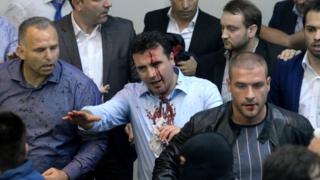 Image copyright
Image copyright
EPA
Social Democrat leader Zoran Zaev was among those injured after a fight broke out
Protesters stormed into Macedonia’s parliament on Thursday after a vote to elect an ethnic Albanian as parliamentary speaker.
Demonstrators from the United Macedonia initiative forced entry into the building in Skopje.
Social Democrat leader Zoran Zaev was left with blood pouring down his face after fights broke out.
The protesters, supporters of ex-prime minister Nikola Gruevski’s VMRO party, are demanding new elections.
Politics in the former Yugoslav republic has been deadlocked since an inconclusive election in December.
Image copyright
AFP / Getty Images
Police tried to contain the intruders
Mr Zaev has created a coalition with ethnic Albanian parties, but his attempts to form a government have been blocked by the president.
Those who stormed parliament were angered by the coalition’s decision to elect Talat Xhaferi as speaker.
Some of the 200 protesters were masked. Witnesses saw broken glass on the floor and traces of blood in hallways.
Police fired stun grenades, according to a report by Reuters, to disperse protesters and allow politicians to exit the parliament building.
Image copyright
AFP / Getty Images
Many of the protesters brought Macedonia’s national flag
A statement from the US Embassy in Macedonia, published on Twitter, said: “We condemn the violence in the strongest possible terms.
“It is not consistent with democracy and is not an acceptable way to resolve differences.”
The secretary general of Nato, Jens Stoltenberg, tweeted that he was “shocked” by the “attacks”.
“All parties should respect democratic process and engage in dialogue, not violence,” he wrote.
“Violence has NO place in Parliament. Democracy must run its course,” tweeted European Union Commissioner Johannes Hahn.
Skopje has also seen regular protests against the coalition by demonstrators who believe it will damage the country’s national unity.
Macedonia came close to civil war in 2001 after an Albanian uprising.
Ethnic Albanians make up around a quarter of the country’s population.
Demostrators storm Macedonia parliament

